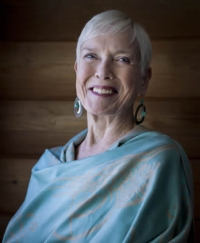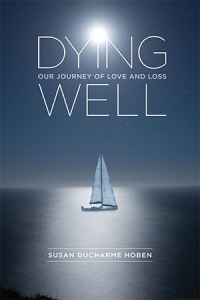3 Secrets to Experiencing Joy With Your Loved One at Their End-of-Life
You don’t often see joy used in the same sentence as death. But when my husband Bruce was diagnosed with an aggressive stage 4 cancer, my family had to confront his impending death and in the process we found ways to surround him with friends, children, grandchildren, laughter, memories, love, and yes, joy.
When Bruce decided to stop treatment, he transitioned from being someone who was sick and fighting for time to someone who was dying and fighting for the things that made him happy - family, traveling, chocolate, wine. By accepting he was dying we were all able to focus our energies on achieving the peaceful end-of-life experience that he wanted. On Bruce’s journey I learned many powerful life-affirming lessons about how laughter can be the best medicine, and one that is especially potent at the end of life.
Here are 3 measures that can bring joy to what appears to be the most heart wrenching experience we can ever face.
1. Invite friends and family on the journey
The first thing Bruce did was reach out to our friends and family. What began as a regular email update that I wrote for family went viral in our extended network of friends. Over time Bruce added his witty post scripts and eventually wrote the updates himself. He wrote a Dear Colleagues email, telling them that he was in the third act of a play called life and that the good news was that he got to say goodbye and experience an outpouring of love and concern and care. He invited them to call, email or visit him. The responses flooded in.
I could count on one hand the days we were not physically surrounded by love and friendship, and on those rare days there were cards and letters waiting in the mailbox, emails and calls, CDs, books, inspirational tokens, and deliveries of homemade food, cradling both of us in love and friendship. Even as Bruce’s health declined we knew this was not a time to ration visits. It was exactly the right time for family, friends, and love.
2. Recreate treasured times
Bruce took a walk down memory lane, visiting his hometown where he retold the stories of his childhood standing in the places where they actually happened. We whisked our young granddaughter away for a few days in New York City, continuing an annual tradition that had begun when she was a toddler. We took our children and grandchildren to a beach house for a week, allowing Bruce (and us) to do the things he loved to do. Every afternoon we reflected on joyous moments of the day, recalling memories and emotions from many happy times spent near the ocean. The memories themselves, as well as the sharing of them, brought all of us joy and comfort.
3. Gather to celebrate a life well-lived
Bruce was the guest of honor at his own “Irish Wake” where revelers shared laughter and tears as they told stories of their times together. Some remembrances were murky and/or partially disputed, a kernel of truth in all of them but needing to be consumed with a shaker full of salt. His colleagues roasted him with hilarious anecdotes and heartwarming tributes, making clear what he had meant to them personally and professionally. Their expressions of love and respect stayed with him until the end and will stay with me for the rest of my life.
Death is an experience we will all share. Our goal should be more than just muddling through. It should be living fully to the very end. It should be embracing joy and celebration. The value to Bruce of the compassion, comfort, and laughter of friends was obvious, but the value to those of us who loved him was equally profound. Our last months were some of the most celebratory, peaceful, and intimate we had shared during our forty-six years together. My transition to being a widow was immeasurably eased by the joy we shared at the end of his life.
Many more of us are dying from disease rather than sudden death. We are also living longer with terminal illnesses. The plus is that we have more time to say goodbye, to live fully and joyously until the end.
Carpe Diem!

